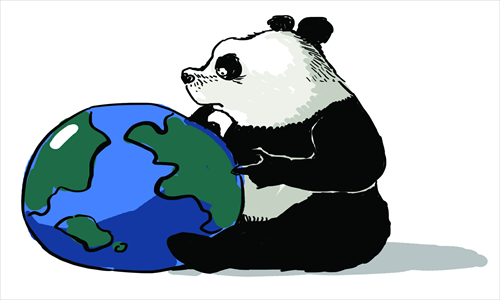China’s new role amid global power shifts

Editor's Note:
Experts on international relations have been talking about power shifts and changes in the global political pattern. What are the characteristics of these changes? How will relations between major countries evolve in the future? Three experts shared their views at the Third Global Think Tank Summit recently held by the China Center for International Economic Exchanges.
Zhang Liangui, a professor at the Party School of the Central Committee of the CPC
If we analyze the big events of the 21st century, China's peaceful rise has to be one of them. But is the world, and China itself, prepared for this change? The answer is not a positive one.
Chinese State media has been talking about China's peaceful rise, but China's neighboring countries don't tend to believe that. Then came theories of the "China threat" and "China collapse," reflecting other countries' fear of a rising China.
China itself is not prepared, either. In the past century, Chinese people suffered great humiliation, leaving a deep scar in people's hearts. Chinese, for a long time, have not been able to get rid of their own image as victims. So they reckon enemies are everywhere and everything they do is aimed at China. Some even say China has come to a historically critical moment and advocate a war between China and the US. Such words are mere exaggeration.
We used to live in the Cold War era. Today factors such as ideologies still dominate the way we act. China still has much to learn in this respect.
One day when China really rises, its influence will be prominent. Such prominence will not come from grabbing from others, but from high-quality public services China can provide to the world.
This natural process is what the experience of the Soviet Union taught China and what China should go through.
Stephen Orlins, president of the National Committee on US-China Relations
I'm not a believer that there's a world center. If you look at military or production of military forces, the US remains the center. If you look at economy, there are various centers. So China is a center, the EU is a center, Japan is a gradually contracting center and the US is a center.
There are also different centers in terms of governance, because the Chinese system of governance is neither intended to be a model for others nor can it be a model. So China is not a center of governance.
There are areas where China and the US are not going to agree for historical, cultural, economic and political reasons. That's OK. The US doesn't agree with Canada, Mexico, and the EU either.
We have economic and diplomatic disputes with China. But what we should never have is strategic disputes with China. The complementarity of US interests and Chinese interests needs to override these disputes.
China is not going to agree with the US on Syria or Iran. But what we need to do is try to move the two countries closer together on those issues and focus on the complementarity.
Sun Zhe, professor at the Institute of International Studies of Tsinghua University
Experts have talked a lot about the shift of power. But we should take a cautious view of this concept.
For example, it is often said that the power of developed countries has shifted to developing countries. But can the political influence of developing countries compete with that of the developed world?
Meanwhile, we have talked about power shifting from countries to countries, but ignored the impact of one country's domestic politics on its diplomacy. Take China. Whether China can tackle its pollution or food safety problems determines how the world sees China.
The world is in a fluid change. Countries through the framework of the UN, regional organizations or nongovernmental organizations set agendas for different topics and get involved in each other's affairs.
China's diplomatic strategies are made against the changing international pattern. China deems itself as a developing country. Its system and ideology confront those of the West.
The maritime disputes with neighboring countries and some extremists in Xinjiang and Tibet seeking independence all pose threats to China's political security. Whether China can choose the right solution, who it associates itself with, and how China makes diplomatic innovations are things China should think about.